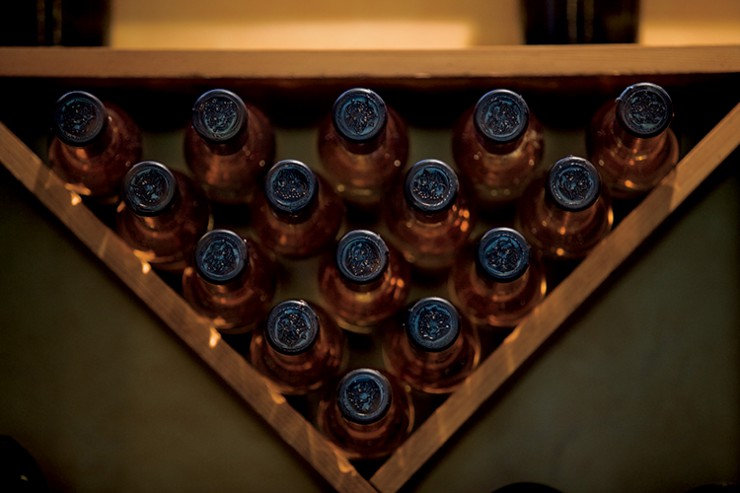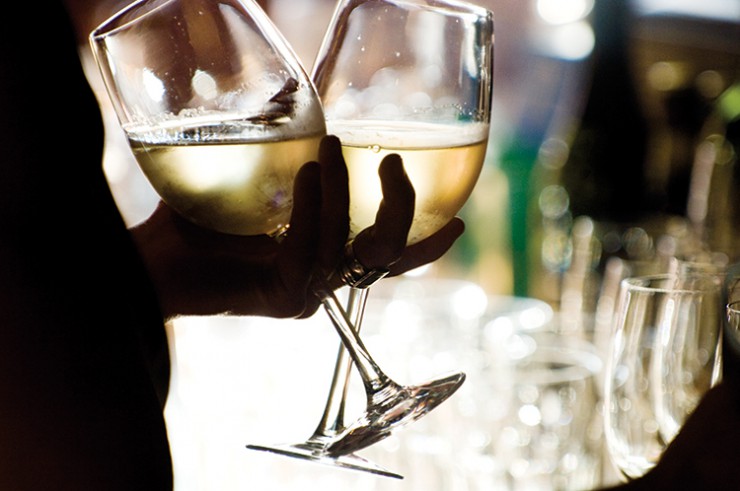Home > New Jersey > New Jersey Agritourism > A Taste for Local Wine
A Taste for Local Wine

Once upon a time, a farmer had the brilliant idea of inviting city-dwellers to come out to his farm and see, taste, smell and experience farm life, with the hope that those visitors would purchase produce while they were there.
This idea later became a popular phenomenon known as agritourism – the lovely marriage between agriculture and tourism – and it’s a match made in heaven for both consumers and farmers.
“We’ve become such an urban society,” says Gary Pavlis, Rutgers Cooperative Extension agent for Atlantic County. “So the chance to get out on a farm, see how things grow and even be part of it – it’s so novel from their daily life. It’s beautiful to be in the open outdoor sunshine, and when you add great food and drink, people want to do it again and again.”
Two-thirds of New Jersey farmers earn at least 50 percent of their farm income from agritourism activities, according to a 2007 Rutgers study entitled The Economic Impact of Agritourism in New Jersey.
The study also found that 90 percent of farmers believe agritourism is very important to the economic viability of New Jersey farms, and 85 percent of farmers see agritourism as an important opportunity to educate the public about their operations and agriculture in general.
New Jersey’s Grape Industry
New Jersey’s wine grape industry is one of the state’s fastest growing agricultural commodities.
“But here’s the kicker – only 1 percent of people who drink wine in New Jersey are drinking New Jersey wines, so that’s where we need to improve,” says Jack Tomasello, co-owner of Tomasello Winery in Hammonton. “We’ll do that through travel, tourism and promoting our wine industry.”
New Jersey’s 50-plus operating wineries have discovered the vast benefits of agritourism in recent years. Virtually all of them offer some type of agritourism, whether through tours, tastings, weddings or music events.
“We host Opera Galas, where people can come eat, drink and hear live opera. We have that event four times per year, and it always sells out,” Tomasello says. Pavlis agrees.
“Agritourism is one of the best ways to sell wine. Only a decade ago, people in New Jersey didn’t realize New Jersey had wineries, and now you’d have to be living under a rock to not know they exist,” Pavlis says. “That’s largely due to events that bring people out to the wineries. It’s become the ‘in’ thing to do.”
New Jersey ranks among the top five states in the nation for wine consumption, and it ranks No. 1 in wine consumption above $25 per bottle.
“That basically means we drink expensive wines,” Tomasello says.
Poster Children For Agritourism
Mark Carduner, co-owner of Working Dog Winery in East Windsor, believes wineries are the “poster child for agritourism” because they allow consumers to see the crop all the way to the finished product.
“Visitors can walk through our 17 acres of vineyards with a glass of Chardonnay in their hand, and that’s a special feeling to actually touch the vines,” Carduner says. “Agritourism is our lifeblood, because we sell 90 percent of our wine from shelves at our property.”
At Working Dog Winery, guests can visit the tasting room, take a self-guided tour of vineyard trails, and attend special events incorporating live music or wine education. Groups of 60 or less can rent the outdoor patio for parties or receptions, and it’s booked just about every weekend.
Buying Local Movement
At the heart of agritourism is the “buy local” movement that’s been sweeping across the U.S. If wineries are any indication, it’s certainly alive and well in New Jersey.
“Buying local is huge, and visitors appreciate that we get our grapes from our own vineyard,” Carduner says. “People love to find unique, natural experiences and then share them with friends. Our customers take ownership in our business because we are local – we are New Jersey. And they’re proud of that.”
![New Jersey Wine [INFOGRAPHIC]](https://eadn-wc01-4177395.nxedge.io/wp-content/uploads/2014/11/Screen-Shot-2014-11-06-at-3.22.47-PM-740x359.png)




![New Jersey Wine [Infographic]](https://eadn-wc01-4177395.nxedge.io/wp-content/uploads/2014/11/Screen-Shot-2014-11-06-at-3.22.25-PM-740x497.png)
